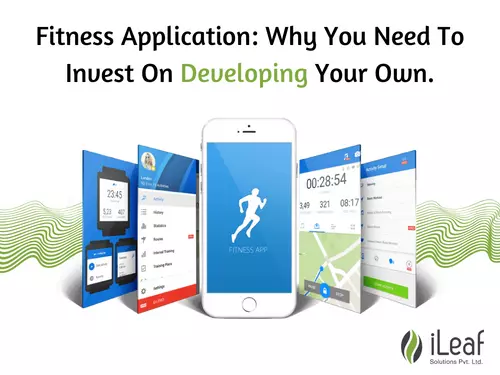Unlocking the Benefits: Why Developing Your Own Fitness Application is a Smart Investment

We all have our reasons for wanting to work out and stay in shape, whether it's driven by passion, pride, or the desire to maintain a healthy lifestyle. Regular exercise not only helps us maintain physical well-being but also contributes to an uplifted mental state, improved immunity, and emotional balance. However, not everyone can afford to maintain a healthy work-life balance, eat well, and dedicate time to go to the local gym. Additionally, the recent global Covid-19 pandemic has further emphasized the importance of immunity and finding alternative ways to stay fit and healthy. At iLeaf Solutions, we understand these concerns and recognize the need to bridge the gap between gyms and their members through the development of fitness applications.
Especially during the pandemic, when local gyms and fitness arenas remain closed to prevent the spread of the disease, it becomes crucial to capitalize on the opportunity to bring fitness regimens and detailed information directly to individuals' homes. A fitness mobile application can serve as a solution, allowing users to access health-related content and personalized workouts from the comfort of their own homes. From a technical perspective, a fitness app falls under the classification of mHealth apps, which prioritize usability and mobility. To gain a better understanding of mHealth apps, you can refer to our previous blog, "Everything to Consider When Developing a Health App," where iLeaf Solutions highlights key aspects of mHealth app development.
Pre-Production of Your Fitness Application
Now that we have captured your attention, let us delve into the process of developing an online mobile fitness application that can enhance your brand's presence in the fitness market and expand your customer base. Here are four fundamental steps to keep in mind before embarking on the development of your fitness application.
Choose the Monetization Model
Before developing your fitness mobile application, it is crucial to decide on the method of monetizing your fitness-related content. There are various models available, such as paid apps, in-app purchases, freemium, ads, or sponsored content. Carefully evaluate which model aligns with your business goals and target audience.
Consider the Basic Features
User-friendliness and effectiveness are key factors to consider when developing any mobile application, including fitness apps. The app should offer a seamless user experience and cater to various scenarios. Common features found in fitness apps include user profiles, notifications, social sharing, and geolocation. The more adaptable and feature-rich your app is, the better the user experience and engagement.
Having a competent, flexible, and compatible team of app developers is crucial for successfully transforming your fitness app idea into a functional solution. This is where our mobile app development team at iLeaf Solutions can assist you, providing expertise and support throughout the development process.
Inception Phase
The inception phase is the initial hurdle you will encounter when developing your mobile fitness application. During this phase, your development team will outline and define the project's scope, create a project roadmap, and plan resources and budget. The discovery phase, which may span several weeks, involves developing functional specifications, designing UX/UI, and creating a visual prototype. This comprehensive approach helps visualize the end product and refine your vision.
Additional Considerations:
- Technical Documentation: Before development begins, it is essential to prepare technical documentation that outlines the product's specifications based on client requirements. This ensures clear communication and enables the development team to propose innovative solutions.
- Design: Designing a strong and visually appealing interface for your application requires time and attention to detail. Strive to create a design that aligns with your standard features and requirements, incorporating custom components and micro-interactions where necessary.
- Workout Application Development: When launching your fitness mobile application on Android and iOS platforms, you will need a team of three primary developers: Android and iOS mobile app developers, as well as a back-end developer. Their combined efforts will bring your app to life.
- Quality Assurance: The final stage of app development involves rigorous testing and bug fixing. Quality assurance engineers evaluate the code for bugs, test the user experience, and ensure that features work as intended. This meticulous process refines your app and prepares it for a successful release.
Conclusion
Developing a unique fitness application to enhance your brand image and attract more customers may initially seem challenging. However, with careful consideration, planning, and the right team, it is an achievable goal. To maximize your app's success, ensure it offers features that complement your workout content, such as personal accounts, goal setting, activity tracking, and interactive elements like custom workout plan creation templates. Consider incorporating gamification features to motivate users and establish a consistent workout routine.
Effective monetization strategies are crucial for boosting revenue in a competitive market. Equally important is having a reliable development team that provides unwavering support. Pay attention to the initial development stage, as proper planning and budgeting help optimize costs.
We hope this guide has shed light on the process of creating a mobile fitness application and provided valuable insights. At iLeaf Solutions, we are dedicated to helping you realize your fitness app vision and ensuring its success. Contact us to embark on this transformative journey and bring your fitness app idea to life.














